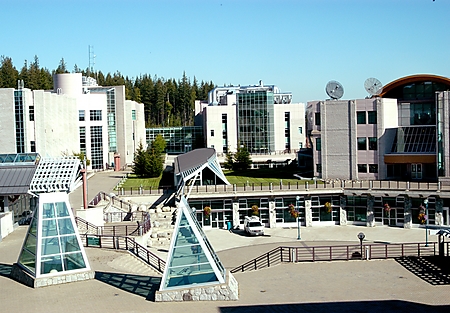UNBC: More Than Just Numbers

Northwest view of UNBC's Prince George campus photo courtesy of UNBC
Prince George, B.C. - It's a pat question that usually elicits a fairly predictable response...
Q: How is enrolment looking for the school year?
A: fill in the blank (up, down, about the same)
But spend any time talking to UNBC's Vice-President of External Relations about enrolment estimates, and Rob van Adrichem will offer up a complex range of other issues he feels need to be considered in the same breath.
Of course, van Adrichem emphasizes, "Enrolment is absolutely fundamental to the operation of the school." The provincial government funds universities and colleges based on enrolment*, and student tuition fees further pad their coffers. So, he points out, "If you're down 100 students, that's $400- to $500-thousand dollar in just tuition, and that's a major hit on your operating budget."
 But the External Relations VP also says the University of Northern B.C. is entering what, he calls, "its adolescence." (photo of van Adrichem, at right, courtesy of UNBC) Gone are the huge enrolment increases that defined the university's early years. Now embarking on its 19th academic season, van Adrichem, says "There are no longer terrific changes from one year to the next, but there has been some gradual, but very clear, trends that have emerged over the past decade over who the students are, where they're from, what they're taking, how old they are, and they're gender."
But the External Relations VP also says the University of Northern B.C. is entering what, he calls, "its adolescence." (photo of van Adrichem, at right, courtesy of UNBC) Gone are the huge enrolment increases that defined the university's early years. Now embarking on its 19th academic season, van Adrichem, says "There are no longer terrific changes from one year to the next, but there has been some gradual, but very clear, trends that have emerged over the past decade over who the students are, where they're from, what they're taking, how old they are, and they're gender."
Only 50-percent of UNBC's student body is made up of the so-called 'traditional' student -- just out of high school. Over the past decade, the number of graduate students doing Masters and PhD programs has almost doubled and enrolment continues to climb at UNBC's regional campuses. As well, the number of women attending UNBC far outpaces men.
Van Adrichem says it's these factors and others that must be added into the mix of determining how best 'to grow' the university.
He points to some of the smaller, very established universities in eastern Canada, like Acadia and Mount Allison, as examples. "They don't grow, they haven't grown in 100-years and that's precisely their mission: is to not grow, to provide a quality education, to be engaged in research, to attract students because of that experience."
And therein lies the challenge for UNBC: "We're confronted, in a sense, by two extremes," he says. "One is that to get more money to offer more programs, to be more relevant to the region and to provide more graduates...implies growth." And yet, van Adrichem says, "Growing can have some effects in terms of the experience that our undergraduates have, sort of the UNBC brand, and the connectivity that the university has with communities -- that all tends to get watered down the bigger you get."
The UNBC spokesperson says it's a contradiction the university will face over the next several years as it tries to find what's really optimum in terms of size, mandate, and the service it provides to the region. "You know, 'What makes the most sense here?' -- and that's a really good question, but nobody knows the answer right now."
As for the original question: enrolment figures for this year won't be out until later this month or early October. The academic year runs from September 1st to August 31st, and while final figures are still being compiled on the 2009-2010 school year, van Adrichem does expect it will be up a bit higher than the year before. "So we're growing gradually, but it's not like it's 5- or 7-percent growth, it's gradual."
______
* According to the Ministry of Advanced Education, the provincial government has invested $19.7-billion dollars in post-secondary education in B.C. since 2001 -- increasing annual operating funding for post-secondary institutions by 55-percent over that time period
Previous Story - Next Story
Return to Home









The graduate FTE increased over the period of 2002-2009 by around +200, but again we see the irrational decision by UNBC in not renewing or promoting the dean of graduate studies in 2007 whose FTE increased by +50%. In management, one motivates good performance with the appropriate reward.
What one can observe, based on the facts and numbers, is that during the 2004-2008 period the same pattern repeated and whoever achieved positive results in increasing FTE in UNBC, e.g. dean of
CASHS (2003-2008) by +400 FTE and dean of graduate studies (2002-2007) by +50% were pushed out and new people were hired to replace them and ironically UNBC only renewed in 2005 the contract of the CSAM dean whose FTE declined by more than -200!
The 2004-2008 dark age in UNBC is anything but "age of adolescence". It is closer to the age of drunkenness and drug use. UNBC has been put on rehab to clean up after
2008 when the UNBC provost and president resigned.